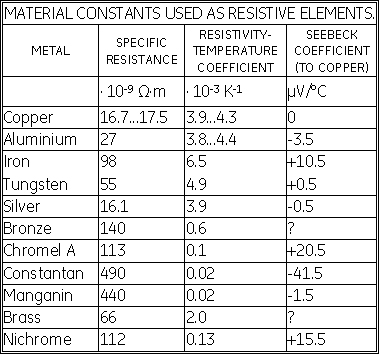- Get link
- X
- Other Apps
The alloy of constantan and manganin has the temperature coefficient of resistance nearly zero. If the 20 resistor is at 40 degree celsius.

Home Made Shunt Resistor Electrical Engineering Stack Exchange

Schoolphysics Welcome

Temperature Coefficient Of Resistance Electronics Notes
This circuit has a total wire resistance wire 1 wire 2 of 30 w at standard temperature.
Temperature coefficient of metal resistor. The typical operating temperature range of a thermistor is 55 0c to 150 0c though some glass body thermistors have a maximal operating temperature of 300 0c. This is accurate for linear relations since the tcr is constant at every temperature. At 200 celsius we get 125 volts across the load and a total of 15 volts 075 075 dropped across the wire resistance.
A resistors temperature coefficient of resistance tcr tells how much its value changes as its temperature changes. The temperature coefficient quoted above would be typical of a metal film resistor. Setting up a table of voltage current and resistance values we get.
0 degree celsius instead of 20 degree celsius. Meaning that the change in value due to a temperature change of 10c will not be more than 50w for every 1mw of the resistors value or 005w for every 1kw of its value. It is usually expressed in ppm0c parts per million per degree centigrade units.
Sometimes the reference temperature can be 273k ie. The temperature coefficient of resistance is usually between 50 and 100 ppmk. Thermistors differ from resistance temperature detectors rtds in that the material used in a thermistor is generally a ceramic or polymer while rtds use pure metals.
Since the electrical resistance of a conductor such as a copper wire is dependent upon collisional proccesses within the wire the resistance could be expected to increase with temperature since there will be more collisions and that is borne out by experiment. Hence temperature coefficient of resistance is negative for non metallic substances and semiconductors. The resistors value would change no more than 0025 ohms.
The tcr is calculated as the average slope of the resistance value over this interval. We can now determine its resistance at this temperature. The temperature coefficient of copper at 20 degree celsius is 0004041.
Typical applications metal film resistors have good characteristics for tolerance stability and tcr. If there is approximately no change in resistance with temperature we can consider the value of this coefficient as zero. The temperature coefficient of resistance for a resistor is determined by measuring the resistances values over an appropriate temperature range.
Contrast to carbon film resistors which almost always have a negative tc the temperature coefficient of metal file resistors are often specified as certain ppm so it is safe to assume that some would have positive tc while others has negative tc depending on resistance value film material and manufacturing process.

Electrical Conduction In Solid Bodies
Technical Note The Reason Why The Shunts Feature 5ppm K What

Positive Temperature Coefficient An Overview

Planet Analog Temperature Coefficients Negative Vs Positive

Resistors Resistivity Thermal Resistance And Temperature

Details About Us Stock 20pcs 1k Ohm Metal Film Resistor 3w 1 3 Watt High Quality

Temperature Coefficient Of Resistance Physics Of

Temperature Coefficient Of Resistance A Shibaura

Temperature Coefficient Of Resistance Physics Of

Strengths And Weaknesses Of Common Resistor Types Ee Times

Temperature Coefficient Of Resistance Physics Of
Resistor Power Rating Derating And Temperature Coefficient
- Get link
- X
- Other Apps
Comments
Post a Comment